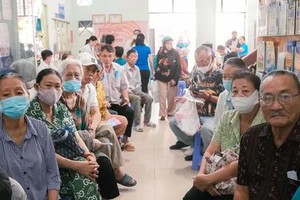Only 10 percent of children in Vietnam are breastfed exclusively during the first six months of life. This situation calls for urgent action to promote breastfeeding, particularly by healthcare providers and communities in Vietnam.

The Ministry of Health, the United Nations and the Alive & Thrive initiative co-organized a press conference to launch World Breastfeeding Week 2010 (WBW) and the “call for action” is just part of WBW.
Deputy Health Minister Nguyen Ba Thuy stressed breastfeeding is the most complete form of nutrition for infants and small children during the first six months of life, only 10 percent of children in Vietnam are breastfed exclusively during this critical period of their lives and only 55 percent of Vietnamese mothers initiate breastfeeding within the first hour after birth.
The main reasons cited for delayed initiation of breastfeeding are a belief that mothers’ breast milk production is inadequate; C-section deliveries; separation of mother and child immediately after birth; insufficient counselling from healthcare providers due to busy schedules; and the availability of milk formula.
Research has also found that feeding infants with water after breastfeeding is a popular practice in both urban and rural areas of Vietnam (‘exclusive breastfeeding’ means infants receive no food or drink other than breast milk unless doctor ordered).
Some mothers believe that they lack sufficient breast milk to adequately nourish their children up to six months and often begin to supplement breast milk with formula milk and/or other foods at around four months of age. For those employed in the formal sector (20-30 percent of all mothers), the need to return to work after four months of maternity leave poses a challenge to continued exclusive breastfeeding. Lack of support from family members and health workers is another barrier to mothers exclusively breastfeeding their children.
Themed "Breastfeeding: Just 10 Steps, the Baby-Friendly Way," World Breastfeeding Week this year aims to highlight the vital role that healthcare workers and facilities play in promoting breastfeeding. It calls for every health facility providing maternity services and care for newborn infants to provide support to mothers in breastfeeding using the ten steps.
The ten steps to successful breastfeeding were first presented in the 1989 WHO/UNICEF Joint Statement on the Protection, Promotion and Support of Breastfeeding: The Special Role of Maternity Services. Since then UNICEF and WHO have called for the implementation of the ten steps to successful breastfeeding in all maternity facilities because health workers play a critical role in influencing mothers’ decisions on how to feed their infants and young children.
WBW is celebrated in more than 120 countries to encourage breastfeeding as an important way to improve the health and development of infants and young children.
Efforts to encourage better breastfeeding practices in Vietnam are part of a national program on children and mother’s care to help ensure that children grow and reach their full potential. The country’s “Child Survival Action Plan” has set out the goal to achieve a 50 percent exclusive breastfeeding rate across the country by 2015.
The Ministry of Health will work closely with line ministries and mass media outlets to achieve the goal, recognizing that without improving breastfeeding rates and child nutrition would jeopardize attaining the Millennium Development Goals in Vietnam.
























